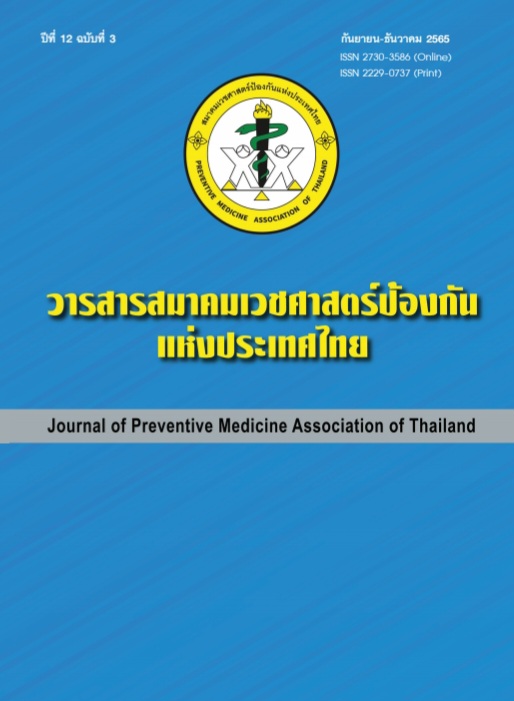The Effect of health Behavior Modification Programme on Self-care Behaviors Management Blood Glucose HbA1c Level and Quality of Life among Uncontrolled Diabetic Patients Phra Nakhon Si Ayutthaya Hospital : Randomized Controlled Trial; RCT
Keywords:
health behavior modification, self-care behaviors management of diabetic mellitus, quality of lifeAbstract
OBJECTIVES: To examine the effect of health behavior modification programme on self-care behaviors management, blood glucose HbA1c level, and quality of life among uncontrolled Diabetic patientsin Phra Nakhon Si Ayutthaya Hospital
METHODS: This study was a randomized controlled trial. The program was developed based on the Trans Theoretical Model (TTM). Study participants were 100 diabetic patients recruited by simple random sampling. They received the programme divided into the experimental group (50 cases), and the control group received the traditional care (50 cases). The effects of the program were evaluated when the diabetic patients completed the blood glucose HbA1c level and questionnaires before and at 1 month and 3 months after the program. Data were analyzed with descriptive statistics and two-factor repeated measure design with repeated measurement on one factor.
RESULTS: The results revealed that diabetic patients in the experimental group had significantly higher score on self-care behaviors management, blood glucose HbA1c level and quality of life than those in the control group, both at 1 month and 3 months after the program. The health behavior modification program was developed based on the Trans Theoretical Model effects of mean score on self-care behaviors management blood glucose HbA1c level and quality of life were statistical significant (p<0.05)
CONCLUSIONS: The health behavior modification program was developed based on the Trans Theoretical Model effects of self-care behaviors management blood glucose HbA1c level and quality of life. This program is based on a decision to change behavior and health beliefs by reviewing one’s own behavior, exchange of knowledge, review of dietary practices, exercise, stress relieve, and the perception of the risk of making the disease more severe. As a result, diabetic patients were able to adjust their behaviors to the point where sugar and sugar levels decreased. Therefore, this approach should be used to encourage patients to understand the importance and awareness of self-care.
References
International Diabetes Federation Europe. IDF Europe annual report 2014 from Melbourne to Istanbul [Internet]. 2014. [cited 2021 Jan 2]. Available form: https://idf.org/component/attachments/?task=download&id=917
The Policy and Strategy Section, Bureau of Non-Communicable Diseases, Ministry of Public Health. 5-year National NCDs prevention and control strategic and action plan (2017-2021) [Internet]. 2017. [cited 2021 Jan 2]. Available form: https://www.who.int/docs/default-source/thailand/ncds/national-ncd-prevention-and-control-plan-2017-2021-eng.pdf.
American Diabetes Association. Standards of medical care in diabetes-2016 abridged for primary care providers. Clin Diabetes 2016;34(1):3-21.
สมาคมโรคเบาหวานแห่งประเทศไทย. แนวทางเวชปฏิบัติสำหรับโรคเบาหวาน 2560 [อินเทอร์เน็ต]. 2560. [เข้าถึงเมื่อ 2 ม.ค.2564]. เข้าถึงได้จาก:: https://w2.med.cmu.ac.th/nd/wp-content/uploads/2019/11/Dm60.pdf.
จิราพร ศรีพิบูลย์บัติ, ทมาภรณ์ สุขสวรรค์, ธีริศา สินาคม. ผลของโปรแกรมการปรับเปลี่ยนพฤติกรรมสุขภาพต่อค่าระดับน้ำตาลและน้ำตาลสะสมของผู้ป่วยเบาหวาน โรงพยาบาลสวรรค์ประชารักษ์. วารสารการพยาบาลและการศึกษา 2563;13(2):47-60.
สำนักงานสาธารณสุขจังหวัดพระนครศรีอยุธยา. ข้อมูลสถิติรายงานโรคไม่ติดต่อเรื้อรัง 2560 [อินเทอร์เน็ต]. 2560. [เข้าถึงเมื่อ 10 ม.ค.2564]. เข้าถึงได้จาก: https://www.dsi.go.th/Upload/4c433256887f8c4b508952eaf6a45794.pdf.
โรงพยาบาลพระนครศรีอยุธยา. ข้อมูลสถิติ 2560. [อินเทอร์เน็ต]. 2560. [เข้าถึงเมื่อ 17 ม.ค.2564]. เข้าถึงได้จาก: http://www.ayhosp.go.th/ayh/
วรัทพร จันทร์ลลิต. ภาวะแทรกซ้อนทางตาจากโรคเบาหวาน. วารสารการแพทย์และวิทยาศาสตร์สุขภาพ 2559;23(2):36-45.
ผาณิต หลีเจริญ. การนำรูปแบบ TTM ไปใช้ในการปรับเปลี่ยนพฤติกรรมเพื่อการป้องกันการเกิดภาวะแทรกซ้อนในผู้ป่วยโรคเรื้อรัง. วารสารพยาบาลกระทรวงสาธารณสุข 2557;13(2):1-11.
Prochaska JO, Velicer WF. The trans-theoretical model of health behavior change. Am J Health Promot 1997;12(1):38-48.
Cohen J. Statistical power analysis for the behavioral sciences. Mahwah, NJ: Lawrence Erlbaum Associate; 1988.
สุพาพร เพ็ชรอาวุธ, นันทิยา วัฒนายุ. ปัจจัยทำนายพฤติกรรมการจัดการโรคเบาหวานด้วยตนเองของผู้ป่วยเบาหวานชนิดที่ 2. นครปฐม: มหาวิทยาลัยมหิดล; 2553.
สุวัฒน์ มหัตนิรันดร์กุล, วิระวรรณ ตันติพิวัฒนสกุล, วนิดา พุ่มไพศาลชัย, กรองจิตต์ วงศ์สุวรรณ, ราณี พรมานะรังกุล. แบบคัดครองทางสุขภาพจิต : เครื่องชี้วัดคุณภาพชีวิตขององค์การอนามัยโลกชุดย่อภาษาไทย [อินเทอร์เน็ต]. 2545. [เข้าถึงเมื่อ 12 ม.ค.2564]. เข้าถึงได้จาก: https://dmh.go.th/test/download/files/whoqol.pdf.
Polit DF, Beck TB. Nursing research: generating and assign evidence for nursing practice. 8th ed. Philadelphia: Lippincott; 2008.
Cummings DM, Lutes LD, Littlewood K, Solar C, Hambidge B, Gatlin P. Impact of distress reduction on behavioral correlates and A1C in African American women with uncontrolled type 2 diabetes: results from EMPOWER. Ethn Dis 2017;27(2):155-160.
นภาลัย มังคละ, นิทรา กิจธีระวุฒิวงษ์. ประสิทธิผลของโปรแกรมการปรับเปลี่ยนพฤติกรรมการบริโภคอาหารโดยประยุกต์ทฤษฎีขั้นตอนการเปลี่ยนแปลงในกลุ่มเสี่ยงเบาหวานชนิดที่ 2. วารสารการพยาบาลและสุขภาพ 2561;12(ฉบับพิเศษ):110-20.
Partapsingh VA, Maharaj RG, Rawlins JM. Applying the stages of change model to type 2 diabetes care in trinidad: a randomised trial. J Negat Results Biomed 2011;10:13.
ดวงธิดา หาคำ, นทพร ชัยพิชิต. การพัฒนาโปรแกรมเพื่อส่งเสริมพฤติกรรมการดูแลตนเองสำหรับการควบคุมน้ำตาลในเลือดของผู้ป่วยเบาหวานชนิดที่ 2. วารสารนเรศวรพะเยา 2564;13(3):43-58
Xu C, Dong Z, Zhang P, Chang G, Xiang Q, Zhang M, et al. Effect of group cognitive behavioural therapy on psychological stress and blood glucose in people with type 2 diabetes mellitus: A community-based cluster randomized controlled trial in China. Diabet Med 2021;38(2):96-110.
Winkley K, Upsher R, Stahl D, Pollard D, Kasera A, Brennan A, et al. Psychological interventions to improve self-management of type 1 and type 2 diabetes: a systematic review. Health Technol Assess 2020;24(28):1-232.
Markle-Reid M, Ploeg J, Fraser KD, Fisher KA, Bartholomew A, Griffith LE, et al. Community program improves quality of life and self-management in older adults with diabetes mellitus and comorbidity. J Am Geriatr Soc 2018;66(2):263-73.
รื่นจิต เพชรชิต. พฤติกรรมการดูแลตนเองและการควบคุมระดับน้ำตาลในเลือดของผู้ป่วยโรคเบาหวาน โรงพยาบาลเคียนซา จังหวัดสุราษฎร์ธานี. วารสารเครือข่ายวิทยาลัยพยาบาลและการสาธารณสุขภาคใต้ 2558;2(2):15-28.
จันจิรา ภู่รัตน์, ปาหนัน พิชยภิญโญ, สุนีย์ ละกำปั่น. ผลของโปรแกรมการส่งเสริมการกำกับตนเองต่อการควบคุมระดับน้ำตาลในเลือดของผู้ป่วยเบาหวานชนิดที่ 2 ที่ควบคุมระดับน้ำตาลในเลือดไม่ได้. วารสารเกื้อการุณ 2563;27(1):20–33.
รังสิมา รัตนศิลา, ขวัญใจ อำนาจสัตย์ซื่อ, สิรินทร ฉันศิริกาญจน, สิริประภา กลั่นกลิ่น, พัชราพร เกิดมงคล. ผลของโปรแกรมการจัดการผู้ป่วยรายกรณีผู้สูงอายุโรคเบาหวานที่ควบคุมไม่ได้. วารสารพยาบาลสาธารณสุข 2558;29(1):67-79.
จันทร์ทิรา เจียรณัย, ศรัญญา จุฬารี, วาริธร ประวัติวงศ์. การส่งเสริมคุณภาพชีวิตของผู้ป่วยเบาหวานด้วยระบบเตือนผู้ป่วยอัตโนมัติทางโทรศัพท์ แบบ 2 ทาง [อินเทอร์เน็ต]. 2563. [เข้าถึงเมื่อ12 ม.ค.2564]. เข้าถึงได้จาก: http://sutir.sut.ac.th:8080/jspui/handle/123456789/8487.
Downloads
Published
How to Cite
Issue
Section
License
Copyright (c) 2023 Journal of Preventive Medicine Association of Thailand

This work is licensed under a Creative Commons Attribution-NonCommercial-NoDerivatives 4.0 International License.
บทความที่ลงพิมพ์ในวารสารเวชศาสตร์ป้องกันแห่งประเทศไทย ถือเป็นผลงานวิชาการ งานวิจัย วิเคราะห์ วิจารณ์ เป็นความเห็นส่วนตัวของผู้นิพนธ์ กองบรรณาธิการไม่จำเป็นต้องเห็นด้วยเสมอไปและผู้นิพนธ์จะต้องรับผิดชอบต่อบทความของตนเอง






